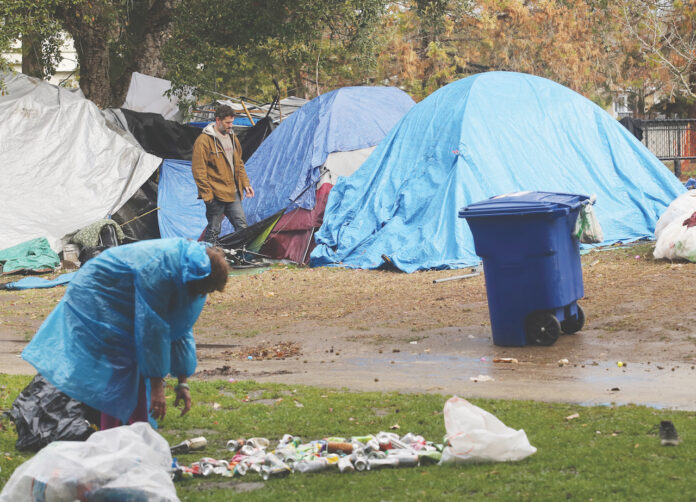A federal judge on Jan. 20 granted a preliminary injunction stopping the City of Santa Cruz from closing a homeless camp in San Lorenzo Park that has swelled to nearly 200 residents since people started moving there in July.
The order, signed by Magistrate Judge Susan van Keulen of the U.S. Northern District Court in San Jose, stops City Manager Martin Bernal’s Dec. 17 executive order to close the camp while the homeless residents, their attorneys and the city work out the matter in court.
“…directing the closure of San Lorenzo Park and the Benchlands at a time when the COVID-19 pandemic is surging and the City’s homeless shelters are full, would leave the homeless persons camping in those locales more vulnerable to COVID-19 than if they were allowed to remain in the encampments,” van Keulen wrote in her order.
Bernal said that the closure would be accomplished in phases, with the goal of temporarily closing the entire park by Jan. 6.
At the heart of the case is the Covid-19 pandemic and the countywide shelter-in-place order meant to slow the spread of the virus. The plaintiffs argue the order applies not only to people with residences, but to homeless people living in shelters and unsanctioned encampments as well.
“The homeless encamped at San Lorenzo Park, and everywhere else in California, are at greater risk of harm from Covid-19 if they are dispersed,” said National Union of the Homeless Lead Attorney Anthony Prince, who filed the motion for preliminary injunction.
The plaintiffs include the Santa Cruz Homeless Union, Santa Cruz Food Not Bombs and several residents of the camp.
Defendants are Santa Cruz City Manager Martin Bernal, Department of Parks and Recreation Director Tony Elliot, Santa Cruz Police Chief Andrew Mills and the City of Santa Cruz.
Both sides are due in court on Jan. 29 to schedule future hearings, and on March 9 to file status reports. They will meet on March 16 to review the conditions of the encampment.
Prince says that the judge’s order will allow residents to remain through those dates, and likely beyond that as the matter winds its way through court.
He says that, in making the order, the court said that the city would violate the county’s stay-at-home order if it dispersed camp residents.
In attempting to close the camp and move residents elsewhere, the city has cited problems at the camp, including vandalism, fire safety, criminal activity, tree damage, trash, and a lack of social distancing or wearing of masks.
Since it was established in July, the city has provided trash service and hygiene resources to the residents.
Prince acknowledges these problems, but said they cannot necessarily be attributed to the homeless residents. Those problems, he added, pale in comparison to the risk of death and fatal disease.
“The majority are not criminals,” he said. “There are almost 200 people in the park, and the vast majority are there because they have no place else to go.”
“If the city breaks up the camp it will definitely put the homeless at risk by separating them from the services they are getting now,” Prince said. “This is a life-and-death situation.”
A judge granted a temporary restraining order on Dec. 30, and on Jan. 6 provided a temporary injunction. The court extended the injunction to Jan. 13 and again to Jan. 20.
Prince attributed the success of the case in part to activists who on Dec. 28 linked arms and used fencing to stop the city from clearing the area.
“If it was not for community members taking nonviolent direct action to successfully blockade the second phase of the city’s sweep of Camp Freedom, this case would have been moot,” he stated in an email.
In a prepared statement, Bernal said that he was “disappointed” in the order.
“I strongly believe that a temporary park closure is urgently needed to address major concerns arising from encampments in San Lorenzo Park,” Bernal said. “With that said, the City will keep a watchful eye on the park and continue to focus on doing what it can, within the confines of the court’s injunction, to address any hazardous or unlawful conditions that exist in the park. We also look forward to meeting again with Judge Van Keulen in March, and we hope, at that point, that vaccine availability may give the court reason to lift or modify the injunction.”
Alicia Kuhl, who worked on the injunction and has served as an advocate for the homeless community, says that the injunction will prevent the city from dismantling the encampment through the Covid-19 crisis.
Kuhl said she hopes the case will serve as precedent in other cities considering similar moves against homeless camps in their jurisdictions.
“We feel that it is a huge accomplishment for our entire community,” she said. “We did this to protect the community in general from Covid-19 exposure.”
“I hope we can find solutions towards the housing crisis,” Kuhl added. “Nobody feels that a park is an adequate place for sleeping. It’s just the best thing we have. We hope eventually to see everyone housed.”













